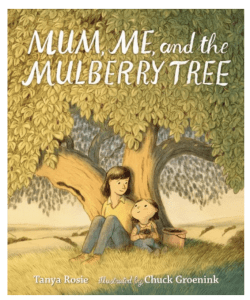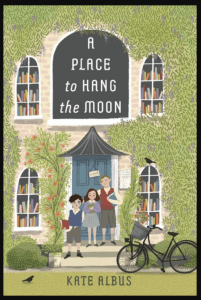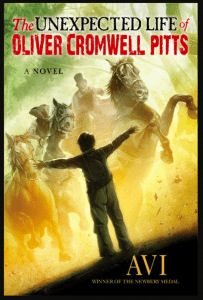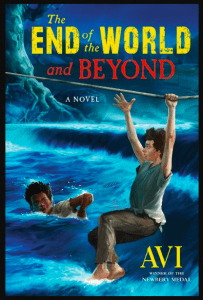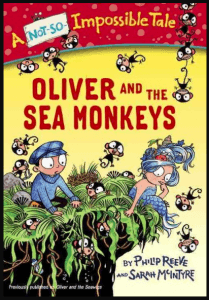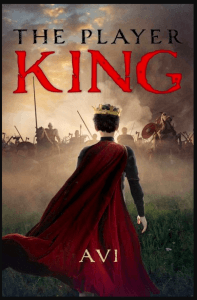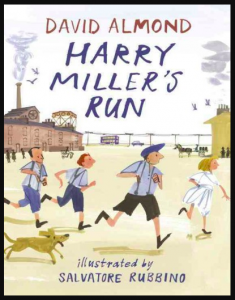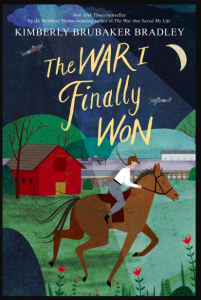Rosie, Tanya. Mum, Me, and the Mulberry Tree. Somerville, Massachusetts: Candlewick Press, 2022.
Early on a summer morning, a little girl sets out with her mother to pick berries. They fill their buckets with mulberries, share a picnic lunch, and come home to make a delicious pie. This cheerful rhyming picture book, set in the English countryside, is recommended for children 5 to 9 years old.
England
A Place to Hang the Moon
Albus, Kate. A Place to Hang the Moon. New York: Holiday House, 2021.
Three orphaned siblings – 12-year-old William, 11-year-old Edmund, and 9-year-old Kate – are evacuated from London during World War II and sent to live in the countryside.
You may have read other stories about British WW 2 evacuees: Good Night, Mr. Tom by Michelle Magorian; The Sky is Falling by Kit Pearson; and The War that Saved My Life by Kimberly Brubaker Baker. You may have read other stories about orphans: Anne of Green Gables by L.M. Montgomery; the Harry Potter series by J.K. Rowling; Pine Island Home by Polly Horvath. The list of similar stories could go on and on and on. So why read this new novel by Kate Albus?
A Place to Hang the Moon is as heartwarming as stories by Beverly Cleary and Eleanor Estes. It is as unflinching in its description of hardships as novels by Avi and Karen Hesse. Kate Albus’s three protagonists display all the determination and resilience found in the best of children’s stories. Why not read another novel that will bring joy to your heart? Recommended for readers 9 to 12 years old.
The Unexpected Life of Oliver Cromwell Pitts
Avi. The Unexpected Life of Oliver Cromwell Pitts: being an absolutely accurate autobiographical account of my follies, fortune, and fate: written by himself. Chapel Hill, North Carolina: Algonquin Young Readers, 2017.
In 1724 England, life is perilous. Twelve-year-old Oliver’s mother died when he was born. His older sister moved from their home in Melcombe Regis, Dorset to the big city of London. And now his father has mysteriously disappeared in the middle of the night. Oliver is on the run, escaping the cruelty of the poorhouse. Quickly-paced in an old-fashioned swashbuckling style, this 313-page novel by the inimitable Avi will undoubtedly appeal to adventure lovers 11 years old and up.
Avi. The End of the World and Beyond: Continues The Unexpected Life of Oliver Cromwell Pitts: Being an Absolutely Accurate Autobiographical Account of my Follies, Fortune & Fate Written by Himself. Chapel Hill, North Carolina: Algonquin Young Readers, 2019.
In this sequel, Oliver suffers the horrors of transport from England to America before being sold into servitude to a violent man and set to work with a black slave in the fields outside the town of Annapolis. How will Oliver survive? Will he escape? Will he ever be reunited with his sister and father? Full of historical details, this action-packed novel will appeal to readers whether or not they have read the previous novel.
Oliver and the Sea Monkeys
Dear Reader,
A bit of wacky humour. Brief loneliness. Lasting friendship, courage, and adventure. An easy-to-read novel that you will finish in no time at all. Only 193 pages, many of them filled with funny illustrations. Read this book when you want a rest from serious novels. Have fun!
Reeve, Philip and Sarah McIntyre. Oliver and the Sea Monkeys. New York : Yearling, 2016, c2013.
Then, when you are ready for a much longer science fiction novel, read Fever Crumb. It’s the first in a challenging series by author Philip Reeve.
Reeve, Philip. Fever Crumb. New York: Scholastic Press, 2010.
Fourteen-year-old Fever has been trained as an engineer in a futuristic culture which believes women are not capable of rational thought. When she leaves her home in London, she makes surprising discoveries and faces unexpected dangers. For 12 – 16 year-olds. [England; Foundlings; Identity; Science fiction; Technology]
Happy reading!
Ms. R.
The Player King
Dear Reader,
You have already enjoyed many stories about characters who set out to search for something. Perhaps you have also read or watched movie versions of these famous quests: Homer’s Odyssey, Tolkien’s Lord of the Rings, and Baum’s The Wizard of Oz. Many folktales and fantasy novels focus on a hero’s journey to find someone or something.
Here is another story that tells of a quest. But this one is not a fantasy novel. This novel is based on something that actually happened long ago in England.
Avi. The Player King. New York: Atheneum Books for Young Readers, 2017.
During the 1400s, two families fought to gain control of the English throne. In 1485, Henry proclaimed himself king and defeated Richard at the Battle of Bosworth Field. But Richard’s supporters did not want to give up the power they’d enjoyed. So they found a boy, Lambert Simnel, and convinced him to pretend that he was the true heir to the crown. All so they could keep their wealth and prestige. This really happened. This novel is a spell-binding tale that tells how a young penniless orphan might have been convinced that he was someone important, someone who was worthy of becoming the king.
By the way, even though the topic is quite serious, this 195-page book isn’t difficult to read. The margins are generous. The lines of print are widely spaced. Many sentences and paragraphs are very short. There is also lots of conversation. You will undoubtedly race through this novel to find out what happens!
Ms. R.
P.S. Any story by Avi is well written. Later you might like to read Crispin, another story from the Middle Ages about a boy on a quest to discover his true worth.
The great achievement…
Almond, David. Harry Miller’s Run. Somerville, Mass.: Candlewick, 2017, c2008.
Eleven-year-old Liam wants to get outside and start training for the big race coming up. But his mother wants him to help an elderly neighbour move into a nursing home. What starts out as a frustrating day turns into an amazing adventure as Liam listens to Harry tell about the great race he ran from Newcastle to South Shields when he was a young lad himself.
This joyous novella – by a multiple award winning author – reads like a true story. I kept checking the flyleaf to find out more about the background. There was nothing. But this heart-warming story by a masterful writer will live in readers’ memories as if it really happened to someone we ourselves must have met somewhere. Whimsical illustrations by Salvatore Rubbino – creator of picture books about London and Paris – add to the charm of this unpaged book highly recommended for readers 9 years old and up.
A serious David Almond novel about refugees
A humorous David Almond novel about a runaway
P.S. Always check out the books published by Candlewick. They’re reliably beautiful.
Seeing goodness…
A multiple award-winner and New York Times bestseller!
Bradley, Kimberly Brubaker. The War I Finally Won. New York: Dial Books for Young Readers 2017.
Do you need courage to have hope? Can you know something but not believe it? How do you learn to overcome fear? The story of Ada and Jamie, evacuated from London in The War That Saved My Life, continues in this 385-page novel recommended for readers 12 years old and up.
The story begins with surgery to repair Ada’s clubfoot. But surgery can’t repair the sense of rejection she still feels from years of abuse. And surgery can’t teach her how to trust anyone except herself. It is steadfast love from her new guardian and her own determination to learn that transforms Ada from a fearful 11-year-old to a confident 14-year-old ready to embrace the goodness of life.
More stories set in World War 2
P.S. Part of the brilliance of this novel is its quiet complexity. While told from the limited point of view of Ada, the reader sees that we all have limited points of view. And sometimes our lack of knowledge limits our ability to see clearly. Lady Thorton is stand-offish due to limitations imposed by her childhood. People in the village mistrust Ruth – a Jewish refugee – due to ignorance of events in Germany. Susan assumes she will be rejected by a friend’s family, and Maggie thinks her mother doesn’t care about her. Over and over again, we see that life may have been terrible in the past but it can still be good in the future. And we are all lovable.
